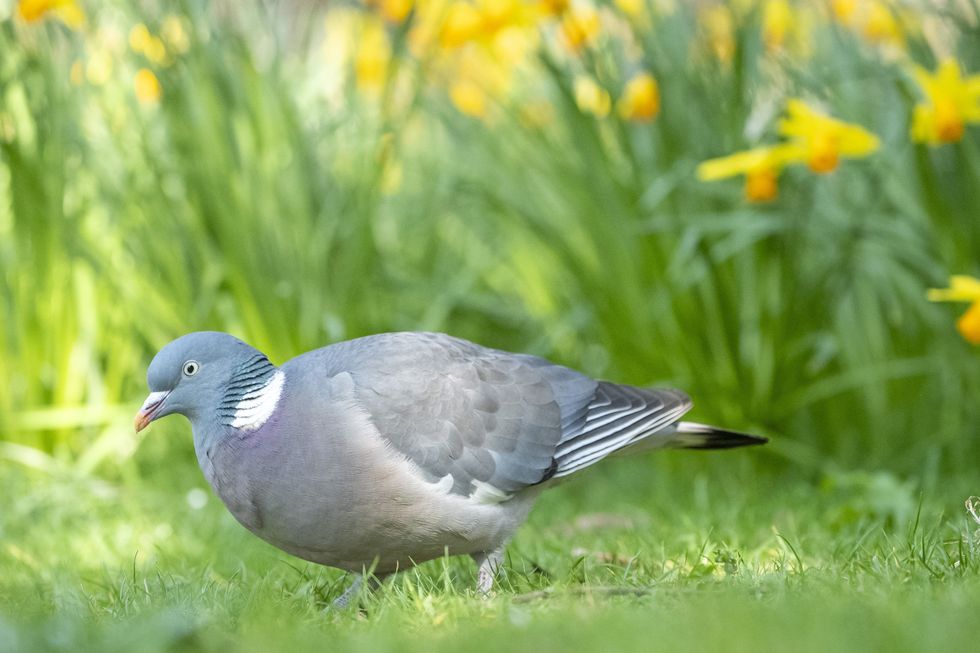Russian scientists unleash squadron of remote controlled spy pigeons fitted with brain implants as part of Vladimir Putin's latest attempt to infiltrate the West

WATCH: Sir Bill Browder says Russia-Ukraine war will not end 'under any of these peace plans'

The company also suggested using other birds such as ravens and albatrosses
Don't Miss
Most Read
Trending on GB News
Russian scientists have unveiled their plans to unleash an army of remote-controlled pigeons fitted with brain implants.
A Kremlin-backed neurotechnology firm has claimed they are able to control live pigeons from the ground, as Vladimir Putin looks to ramp up surveillance in the country.
The so-called "bird-biodrones", otherwise known as PJN-1, have a neural chip implanted into their brain, meaning technicians can direct and control their flight routes.
Field tests are currently being undertaken for the PJN-1, who carry a tiny solar-powered backpack that contains onboard electronics, GPS tracking, and a receiver.
TRENDING
Stories
Videos
Your Say
Operators are able to upload flight commands by stimulating targeted regions of the brain, with the pigeon "believing it wants to fly".
"The stimulator sends impulses influencing the bird's motivation to turn left or right, for example. System positioning is performed using GPS and other methods," Russian tech firm Neiry explained.
The company chillingly claims "no training is required", adding that they can fly up to 310 miles a day, more than 1,850 miles in a week on spy missions - terrifyingly, bigger birds may soon be weaponised.
"Right now, the solution works on pigeons, but any bird can be used as the carrier," said Alexander Panov, company founder.

Russian scientists have unveiled their plans to unleash an army of remote-controlled pigeons fitted with brain implants
|East2West
"For transporting heavier payloads, we plan to use ravens, for coastal monitoring — seagulls, and for large marine territories — albatrosses."
Neiry is closely tied to the Russian state. It has won financing from the National Technology Initiative and investment outfits linked to RDIF – the Kremlin’s sovereign wealth fund.
Additionally, the RDIF is run by Kirill Dmitriev, a close Putin ally who is currently acting as a negotiator in talks with the US over the war in Ukraine.
For Neiry's "latest product", the PJN-1, the disturbing procedure requires surgery so precise that electrodes are inserted into the brain within a matter of millimetres.
LATEST DEVELOPMENTS:

There is a huge population of pigeons in cities across Russia, meaning the PJN-1 could blend in very easily
|PA
While Neiry says it is "striving for a 100 per cent survival rate", it has not confirmed how many, if any, birds have died during or after the sinister surgery.
The company did add further insight into the thought behind the so-called "bird-biodrones", and what they could be used for by the Kremlin.
"The pigeon-biodrone PJN-1 differs from an ordinary bird only by the neuro-interface wire protruding from its head and the small backpack containing electronics," the company said.
"Its main purpose is to provide almost any type of monitoring — for example, environmental or industrial — to carry out search-and-rescue operations, and to serve as an additional security layer."
Discussing any potential safety risk to the bird, they added: "The risk of a biodrone falling or crashing is low and equals the natural probability of a bird falling from the sky. Therefore, biodrones can be safely used in cities."
Eerily, Neiry have claimed the bio-birds could blend into normality with relative ease - opening the door to unprecedented levels of surveillance.
Cities like Moscow boast mammoth pigeon populations, meaning spotting a PJN-1 in the air could prove remarkably difficult.
Security experts have also warned that the biodrones could easily be redirected into espionage or military missions, potentially carrying secret cameras or sensors.
And it is not the first time Neiry has come under criticism for its controversial animal ideas - it previously tried to tamper with cow brains in a bid to boost milk yields.
Russia itself also has a history of training animals for combat; their famous and long-lasting dolphin experiments included making them patrol seas, plant mines or conduct reconnaissance.
Our Standards: The GB News Editorial Charter
More From GB News










